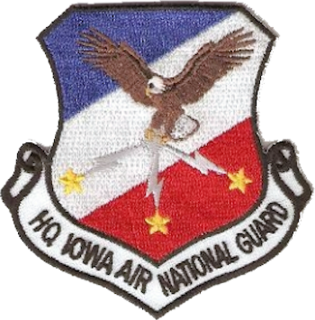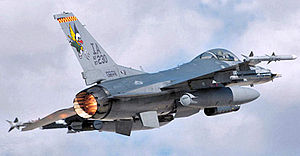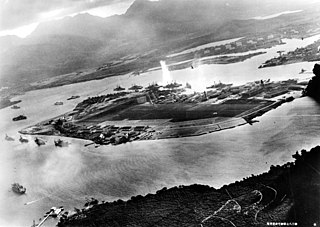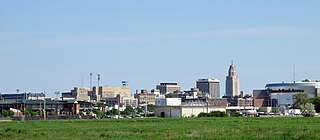
The 121st Air Refueling Wing is a unit of the Ohio Air National Guard, stationed at Rickenbacker Air National Guard Base, Columbus, Ohio. If activated to federal service, the Wing is gained by the United States Air Force Air Mobility Command.

The 180th Fighter Wing is a unit of the Ohio Air National Guard, stationed at Toledo Air National Guard Base, Ohio. If activated to federal service, the Wing is gained by the United States Air Force Air Combat Command.

The 120th Fighter Squadron is a unit of the Colorado Air National Guard 140th Wing located at Buckley Air Force Base, Aurora, Colorado. The 120th is equipped with the F-16C/D Fighting Falcon.

The 104th Fighter Squadron is a unit of the Maryland Air National Guard 175th Wing stationed at Warfield Air National Guard Base, Middle River, Maryland. The 104th is equipped with the A-10 Thunderbolt II.

The 143d Airlift Squadron is a unit of the Rhode Island Air National Guard 143d Airlift Wing located at Quonset Point Air National Guard Station, Rhode Island. The 143d is equipped with the C-130J Hercules.

The 169th Airlift Squadron is a unit of the Illinois Air National Guard 182d Airlift Wing located at Peoria Air National Guard Base, Peoria, Illinois. The 169th is equipped with the C-130H3 Hercules.
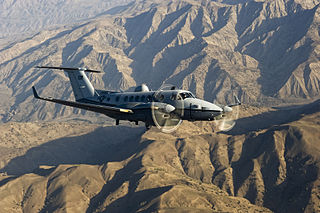
The 185th Special Operations Squadron is a unit of the Oklahoma Air National Guard 137th Special Operations Wing located at Will Rogers Air National Guard Base, Oklahoma City, Oklahoma. The 185th is the only National Guard unit to be equipped with the MC-12W. While commonly known as "Liberty" the aircraft does not have an official nickname and AFMC's Project Liberty Office was closed upon transfer of the aircraft to the Project Javaman Office for support to US SOCOM. Liberty was named after the WWII Liberty Ship rapid shipbuilding project while Javaman was named after a declassified WWII Naval project involving remote control attack boats controlled by retrofitted bomber aircraft. The unit is known as the "SOONERS." Famous unit alumni include former VietNam POW Brig. Gen. James Robinson "Robbie" Risner and Astronaut Captain Fred Wallace Haise Jr., Apollo 13 Lunar Module Pilot.

The 173d Air Refueling Squadron is a unit of the Nebraska Air National Guard 155th Air Refueling Wing. It is assigned to Lincoln Air National Guard Base, Nebraska and is equipped with the Boeing KC-135 Stratotanker.

The 174th Air Refueling Squadron is a unit of the Iowa Air National Guard 185th Air Refueling Wing. It is assigned to Sioux City Air National Guard Base, Iowa and is equipped with the KC-135R Stratotanker aircraft.

The 153d Air Refueling Squadron is a unit of the Mississippi Air National Guard 186th Air Refueling Wing located at Key Field Air National Guard Base, Mississippi. The 153d is equipped with the KC-135 Stratotanker aircraft.

The 103d Attack Squadron is an active unit of the Pennsylvania Air National Guard previously known as the 103d Fighter Squadron. It is assigned to the 111th Attack Wing, stationed at Naval Air Station Joint Reserve Base Willow Grove, Willow Grove, Pennsylvania. The squadron was inactivated on 31 March 2011 and later reactivated as the 103d Attack Squadron at the new Horsham Air Guard Station, on the grounds of the former Naval Air Station Joint Reserve Base Willow Grove. Along with these name changes came a change of mission. The 103d Attack Squadron now flies the MQ-9 Reaper Remotely Piloted Aircraft.

The 110th Bomb Squadron is a unit of the Missouri Air National Guard 131st Bomb Wing located at Whiteman Air Force Base, Knob Noster, Missouri. The 110th is equipped with the B-2 Spirit.

The 125th Fighter Squadron is a unit of the Oklahoma Air National Guard 138th Fighter Wing located at Tulsa Air National Guard Base, Oklahoma. The 125th is equipped with the Block 42 F-16C Fighting Falcon.

The 134th Fighter Squadron is a unit of the Vermont Air National Guard 158th Fighter Wing located at Burlington Air National Guard Base, Burlington, Vermont. The 134th is equipped with the Block 30 F-16C/D Fighting Falcon.

The 122d Fighter Squadron is a unit of the Louisiana Air National Guard 159th Fighter Wing located at Naval Air Station Joint Reserve Base New Orleans, Louisiana. The 122d is equipped with the F-15C/D Eagle.

The 112th Fighter Squadron is a unit of the Ohio Air National Guard 180th Fighter Wing located at Toledo Air National Guard Base, Ohio. The 112th is equipped with the F-16C/D Fighting Falcon.

The 127th Command and Control Squadron was a unit of the Kansas Air National Guard 184th Intelligence Wing stationed at McConnell Air Force Base, Wichita, Kansas. The 127th was a non-flying squadron operating the Distributed Common Ground System. The unit was inactivated on 29 September 2014.

The 128th Airborne Command and Control Squadron is a unit of the Georgia Air National Guard 116th Air Control Wing located at Robins Air Force Base, Georgia. The 128th is equipped with the E-8C Joint STARS.

The 132d Wing is a United States Air Force unit assigned to the Iowa Air National Guard and located at Des Moines Air National Guard Base, Iowa. The 132nd's World War II predecessor unit, the 365th Fighter Group was a IX Fighter Command unit, serving in the European Theater of Operations. The 365th, known as the "Hell Hawks", was one of the most successful P-47 Thunderbolt fighter groups of the Ninth Air Force when it came to air combat. The 365th was awarded two Distinguished Unit Citations; Order of the Day, Belgium Army; Belgium Fourragère, and the Belgium Croix de Guerre. The 365th Fighter Group flew its last mission on 8 May 1945. After having operated manned fighter aircraft for all of its prior history, the wing was equipped with the MQ-9 Reaper unmanned aerial vehicle in 2013.


